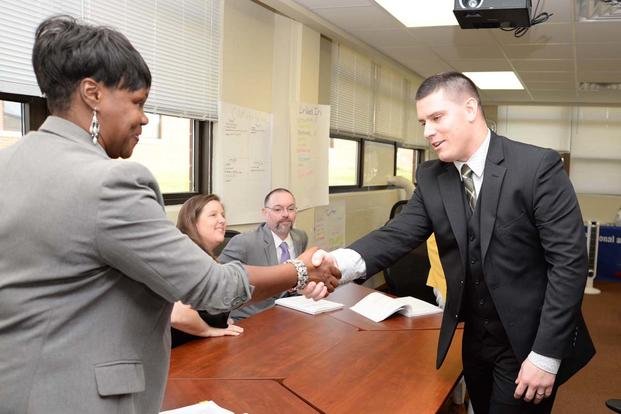For many separating veterans, just getting an interview in a tight job market is an achievement. But regardless of whether you feel landing the job is a sure thing, it's still always a good idea to plan for the interview to go well and anticipate all of the trappings that come with an interview that goes well.
Traditional signs that someone is really nailing a job interview include fluid conversation, a discussion about salary expectations and the inevitable: "Do you have any questions for me?"
Yes. The answer to that question should always be "yes." And those questions are where a candidate can either shine or will tank their entire interview. It's not to be taken lightly.
The unprepared interviewee might say yes (because everyone knows the answer is supposed to be "yes") and then scramble desperately to think of questions to ask. Not only will it be apparent the interviewee wasn't prepared and doesn't really know what to ask, but it's also likely the job applicant will not remember whatever questions they ultimately asked.
Related: Study the 10 Most Common Interview Questions
This is where preparation is key. Need some help? Here are a few all-purpose basic questions for the end of a job interview that will actually provide answers to quality information a new employee would want to know.
1. How Long Have You Worked Here?
This is a great question for both interviewee and interviewer, because it allows the person being interviewed to get a sense of their length of experience at the company while getting a feeling for who that interviewer is as a person.
It is actually a good idea to find a way to ask this question very early on in the interview, so you can determine the tone of the rest of the interview. Will the next 30 minutes to an hour be conversational and social or strictly formal? This is a good barometer for how to approach the interview (and further questions).
2. What's Unique About Working Here That You Haven't Seen Elsewhere?
This is a question that allows the interviewer to be a human for a little bit and will allow the candidate to show a more human side to themselves. Conversationally, it's also a chance for the interviewer to see the human side of the person interviewing for a job, and not just someone who lived a resume.
3. What Are the Company's Current Major Challenges?
A question like this shows a candidate can be involved in the future of the company while giving the interviewer the chance to talk about a subject that could be at the forefront in their mind.
For the interviewer, it's also a chance to demonstrate how well you might handle being a part of the team through those challenges or an understanding of those challenges. It even offers the possibility to ask how your role would be involved in overcoming challenges in the future. It also demonstrates that the candidate is ready for the good and bad side of a company.
4. What Reservations Do You Have About Hiring Me for This Position?
This is another opportunity for the candidate to help frame themselves as a good fit for the job in the mind of the employer. The implied question here is, "How can I answer any lingering doubts you have about hiring me for this job?"
A conversational interviewer will allow the interviewee to address the list of reservations after they list them for you. If they really, truly can't answer any of the thoughts the interviewer gives, it's a chance for the candidate to show how well they handle failure.
"That's something I can take forward and work on," is a great reply.
5. What Characteristics Would Help Me Be Successful in This Role?
While reiterating that the candidate knows what is required of the applicant to fill the role (after all, they wouldn't have made it to the interview without the right qualifications), ask how the company would measure and define success. This will also give the candidate a chance to mention previous experience, education or insight into those metrics for success.
6. A Personal, Real Question
There is no substitute for asking an interviewer about the things that truly matter, whatever they are. How long is their commute? Do they get to spend a lot of time with their children? What is the potential for promotion here? Do the benefits get better the longer you stay with the company? How much travel is really required? What's an average day like for someone in the role?
All of these questions (if someone really cares about the answers) are an opportunity to show the hiring manager, interviewer or recruiter that the candidate asking is a qualified, likable person who can genuinely see themselves working for that company.
-- Blake Stilwell can be reached at blake.stilwell@military.com. He can also be found on Twitter @blakestilwell or on Facebook.
Want to Know More About Veteran Jobs?
Be sure to get the latest news about post-military careers as well as critical info about veteran jobs and all the benefits of service. Subscribe to Military.com and receive customized updates delivered straight to your inbox.







